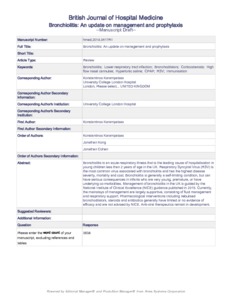Karampatsas, K; Kong, J; Cohen, J
(2019)
Bronchiolitis: an update on management and prophylaxis.
Br J Hosp Med (Lond), 80 (5).
pp. 278-284.
ISSN 1750-8460
https://doi.org/10.12968/hmed.2019.80.5.278
SGUL Authors: Karampatsas, Konstantinos
![[img]](https://openaccess.sgul.ac.uk/110874/6.hassmallThumbnailVersion/hmed.2018.0417_R1.pdf)  Preview |
|
PDF
Accepted Version
Available under License ["licenses_description_publisher" not defined].
Download (1MB)
| Preview
|
Abstract
Bronchiolitis is an acute respiratory illness that is the leading cause of hospitalization in young children less than 2 years of age in the UK. Respiratory syncytial virus is the most common virus associated with bronchiolitis and has the highest disease severity, mortality and cost. Bronchiolitis is generally a self-limiting condition, but can have serious consequences in infants who are very young, premature, or have underlying comorbidities. Management of bronchiolitis in the UK is guided by the National Institute for Health and Care Excellence (2015) guidance. The mainstays of management are largely supportive, consisting of fluid management and respiratory support. Pharmacological interventions including nebulized bronchodilators, steroids and antibiotics generally have limited or no evidence of efficacy and are not advised by National Institute of Health and Care Excellence. Antiviral therapeutics remain in development. As treatments are limited, there have been extensive efforts to develop vaccines, mainly targeting respiratory syncytial virus. At present, the only licensed product is a monoclonal antibody for passive immunisation. Its cost restricts its use to those at highest risk. Vaccines for active immunisation of pregnant women and young infants are also being developed.
Statistics
Item downloaded times since 29 May 2019.
Actions (login required)
 |
Edit Item |



